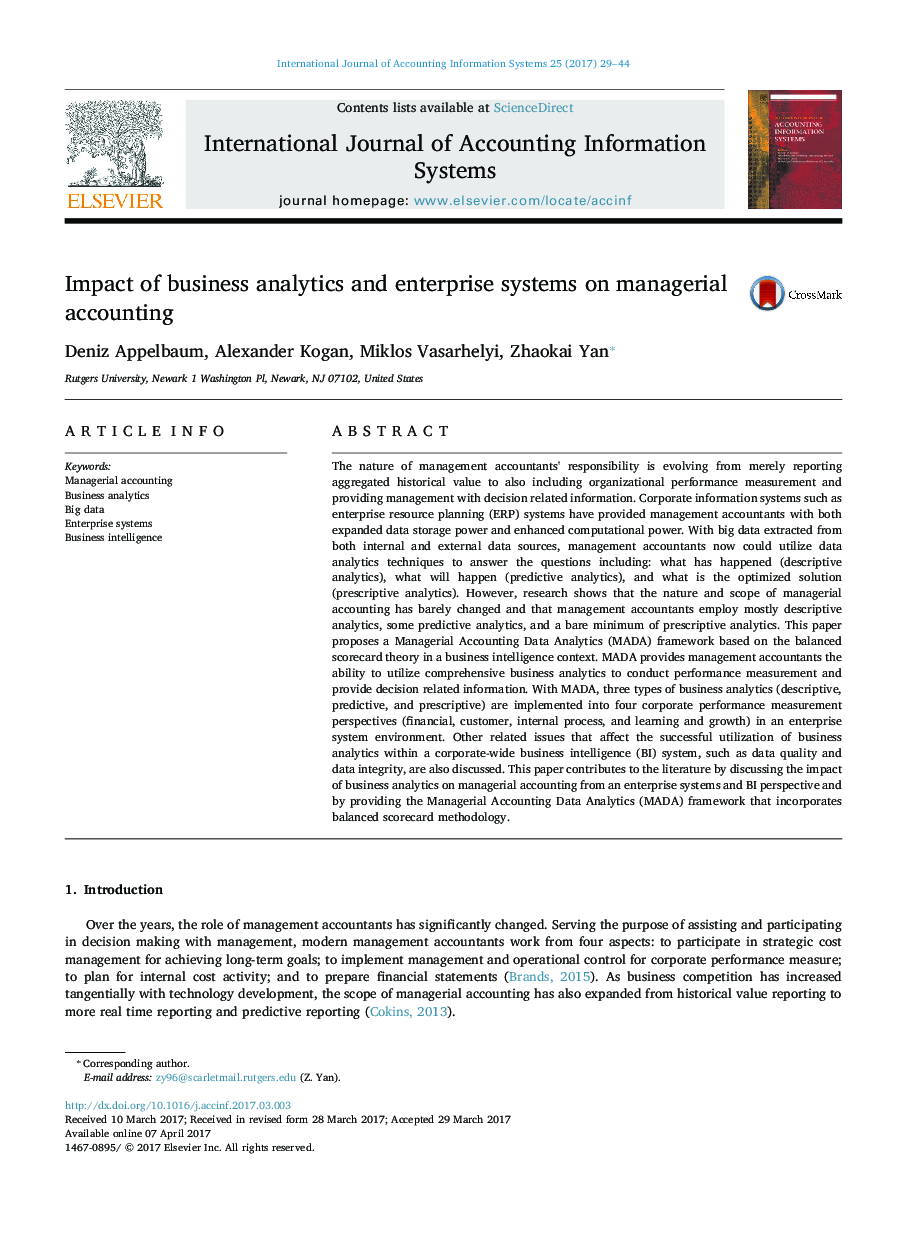| کد مقاله | کد نشریه | سال انتشار | مقاله انگلیسی | نسخه تمام متن |
|---|---|---|---|---|
| 5107678 | 1481996 | 2017 | 16 صفحه PDF | دانلود رایگان |
عنوان انگلیسی مقاله ISI
Impact of business analytics and enterprise systems on managerial accounting
ترجمه فارسی عنوان
تاثیر تجزیه و تحلیل کسب و کار و سیستم های سازمانی بر حسابداری مدیریت
دانلود مقاله + سفارش ترجمه
دانلود مقاله ISI انگلیسی
رایگان برای ایرانیان
کلمات کلیدی
حسابداری مدیریتی، تجزیه و تحلیل کسب و کار، اطلاعات بزرگ، سیستم های سازمانی، هوش تجاری،
موضوعات مرتبط
علوم انسانی و اجتماعی
مدیریت، کسب و کار و حسابداری
حسابداری
چکیده انگلیسی
The nature of management accountants' responsibility is evolving from merely reporting aggregated historical value to also including organizational performance measurement and providing management with decision related information. Corporate information systems such as enterprise resource planning (ERP) systems have provided management accountants with both expanded data storage power and enhanced computational power. With big data extracted from both internal and external data sources, management accountants now could utilize data analytics techniques to answer the questions including: what has happened (descriptive analytics), what will happen (predictive analytics), and what is the optimized solution (prescriptive analytics). However, research shows that the nature and scope of managerial accounting has barely changed and that management accountants employ mostly descriptive analytics, some predictive analytics, and a bare minimum of prescriptive analytics. This paper proposes a Managerial Accounting Data Analytics (MADA) framework based on the balanced scorecard theory in a business intelligence context. MADA provides management accountants the ability to utilize comprehensive business analytics to conduct performance measurement and provide decision related information. With MADA, three types of business analytics (descriptive, predictive, and prescriptive) are implemented into four corporate performance measurement perspectives (financial, customer, internal process, and learning and growth) in an enterprise system environment. Other related issues that affect the successful utilization of business analytics within a corporate-wide business intelligence (BI) system, such as data quality and data integrity, are also discussed. This paper contributes to the literature by discussing the impact of business analytics on managerial accounting from an enterprise systems and BI perspective and by providing the Managerial Accounting Data Analytics (MADA) framework that incorporates balanced scorecard methodology.
ناشر
Database: Elsevier - ScienceDirect (ساینس دایرکت)
Journal: International Journal of Accounting Information Systems - Volume 25, May 2017, Pages 29-44
Journal: International Journal of Accounting Information Systems - Volume 25, May 2017, Pages 29-44
نویسندگان
Deniz Appelbaum, Alexander Kogan, Miklos Vasarhelyi, Zhaokai Yan,
